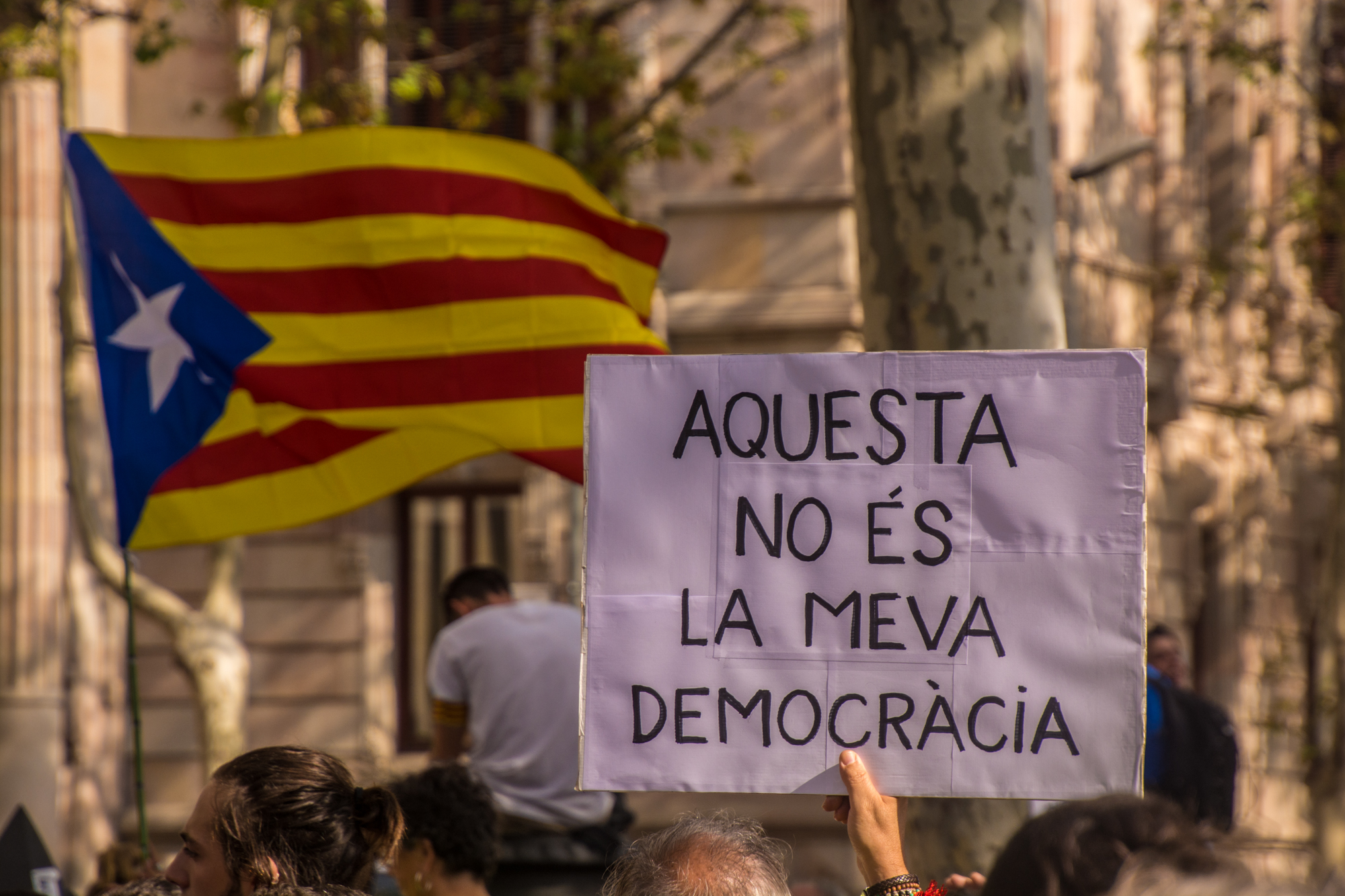When the roller-coaster that is Catalan Secessionism seems to be at a peak, the next day surprises us with another loop-the-loop; a peaceful unconstitutional referendum stifled by a repressive crackdown, followed by a unilateral declaration of independence, a catch-me-if-you-can around Brussels, and an election round with incarcerated candidates. Netflix would dream of such stupefying cliff-hangers. Surely, we could entertain ourselves at length discussing each episode, but to grasp what is at stake in the bigger picture and trace how their development speaks to the future of Europe as a whole, it is important to place them within the context of other recent ‘democratic’ trembles. Although the specific circumstances in Catalonia owe much to its particular history and make it unique, the secessionist movement is yet another expression of globalization’s pervading malaise.
How We Got Here
The manifest Catalan secessionist sentiment can be traced back to the 17th century’s Els Segadors peasant revolt that under the slogan of ‘long live the land, death to bad government’ gave name to the current Catalan anthem. Throughout history the Spanish state has been unable to find a stable fit to account for the country’s plurinational nature. Arguably, the most ‘stable’ period took place during Franco’s 40-year dictatorship, who through a nationalistic homogenization policy exerted a systematic suppression of all cultural diversity by prohibiting all non-Spanish languages and revoking the relative autonomy of the historical regions of Catalonia, Galicia and the Basque Country. With the turn of democracy regional competencies were restored but as Franco himself declared in his final years, he had left everything ‘tied up, and well tied up’. Hence, the regime functioned for the next 40 years, enabling remarkable economic growth, significant social conquers, and a late but robust welfare state. However, the territorial question remained tied under the table until the advent of 2008’s financial crisis.
The trigger of Catalan secessionism concurred precisely with the court sentence of 2010 that deemed the novel Estatut (set of institutional regulations, competences and financial arrangements with the rest of Spain) unconstitutional after a claim filed by the conservative Popular Party. This devastating blow against a legislation which had been approved by an overwhelming majority via a referendum ,effectively delineated the field, the rules, and the players that would participate in the ‘game’ that is the present Catalan crisis. On the one hand, there are the unionists who lacking any seductive political solution defend their position through the judiciary, using an antiquated constitution as their last redoubt. On the other, there is the secessionist side which has managed to coalesce a diverse spectrum of political sensibilities around a common pole of opposition against Spanish centrism.
Today the battle continues, at levels of unprecedented zeal, since a complex mesh of grievances is active. For some, the cultural-linguistic question is the defining feature of the discord. Others underscore economic concerns. And more and more people are have jumped on the bandwagon that sees secession as the only viable option against the utter irreconcilability with the Spanish state. The right to decide lies at the heart of the independentist cleavage. But request to recover lost sovereignty is not unique to the Catalan situation. It is also the keystone that explains the contemporary effervescence of protest across the industrialized West.
Owen Jones referred to Brexit as a working-class revolt, suggesting that massive sectors had expressed their discontent after years of harmful economic policies responsible for a systematic erosion of living conditions. In the US, Trump’s victory brought up similar analyses.
Rather than taking these experiences as a lesson from which to begin a serious reflection of the circumstances that have led up to these seemingly unpredictable results, the generalized response in all cases has been to deny the legitimacy of the outcome. In the US, Russian meddling and the electoral college were used to put in doubt the fairness of the election. In the UK, it was the voters who had been brainwashed with intolerance and xenophobic rhetoric. And in Catalonia, the whole referendum was rejected on legal grounds. Certainly, in the so called ‘post-truth’ era, these concerns cannot be entirely rejected because in all cases they underscore the evident. The problem lies in how they fall short of furnishing a complete explanation. And what is more preoccupying is that by questioning the intelligence of voters, the issues that should or should not be voted upon, or whether voting is legal or not, these reactions express an increasingly widespread disdain for democracy.

The Demand for Change
Education, constitutions, and the rule of law are fundamental pillars of democracy, but they are not timeless. The curse of time affects everything and everyone, and when things get old, they rust. Institutions, like cars, reach a point where they need restoration. I may not know what kind of car I want, but I am dead certain that I do not want a broken car. In the cases described above voters’ actions may have been driven by problematic motivations, but in every case the statement was clear: ‘what functioned before, is not working any longer’. After years of deregulation, offshoring, deindustrialization, and a hollowing out of the welfare state, the sentiment of impotency against global elites is being translated into resistance through diverse means. The common kernel however, is a demand for sovereignty. The noble yearn to take the reins of institutions through democratic control.
In Catalonia the secessionist movement adopted the claim for sovereignty against a rancid intransigent central government that for years has been unwilling to accommodate even the sheer possibility of a people’s right to self-determination. Indeed, a constitutional amendment would have been required for a legally binding referendum to take place, and the support for the ‘right to decide’ (not for secession) has been around 80% even for Catalan unionists. And here lies the paradox. Until a couple of years ago most Catalans were against secession but at least wanted to be asked about it. The Popular Party (at this point with an absolute majority in both chambers) could have won the independence referendum in light of the low popularity of secessionism at that point. Had the government listened to what most Catalans wanted, we would not be at the current level of tension. So why did Rajoy not allow a referendum á la Scotland, when he would have probably won?
This paradox is resolved if we link the Catalan scenario to the Western crisis of sovereignty which is degenerating into an outright fear of democracy on behalf of the elites. Perhaps Rajoy was ahead of his time and knew perfectly well that having all odds in one’s favour is of no guarantee in such a volatile period. After all, the Scottish referendum was a close call and the lesson from Brexit and Trump’s unforeseen victory is that democracy may backfire against the establishment. Against this backdrop, the Spanish government’s disposition to solve political problems through judicial means alone, along with the decision to send five thousand police units to quell passive protesters, and the incarceration of electoral candidates, is a sample of the type of paradigm Europe could be approaching. The authoritarian slide in Poland and Hungary’s racist drift, offer another example of the dangerous direction some European member states are venturing into.
Europe’s Fate
Unfortunately, Europe’s passivity in this matter is inherent to the institutional design which restricts its legal toolkit when it comes to intervening in states’ internal affairs. Nonetheless, this limitation did not apply when debt re-payments were at stake. The European Central Bank had no reluctance when it essentially ordered the Spanish president Zapatero back in 2011 to modify the constitution to prioritize “fiscal sustainability and structural reforms” over social spending. Without consulting the electorate, the government acquiesced and approved a transcendental constitutional reform that opened the door to labour market deregulation and egregious austerity measures. Six years later, the same forces that propelled this reform without fear or favour are proclaiming that a self-determination referendum is unconstitutional. Sow, wind, and reap the whirlwinds.
When sovereignty is demanded from the elites, their reaction has been rather homogeneous: an increasing allergy to democracy. It is not surprising that when majorities attempt to recuperate control of the important decisions that impact their lives through democratic procedures, those who benefit from the current status quo repudiate any sort of structural change. But as the number of losers of globalization increases, so will the urgency to discuss and reformulate the political contracts which have worked for decades but are now running out of steam. If we reject immobility as an option (it was Rajoy’s passivity in the Catalan affair which led him to the current cul-de-sac from which he can only escape via repressive measures), there exist at least two distinct pathways to move on from here. For Catalonia and Europe as a whole.

The first option is to articulate sovereignty within a nationalistic and reactionary discourse. Brexit, Trump, and the rise of the far right across Europe reflect endeavours that certainly seek to regain sovereignty, but by taking us back to a mythicized past. Despite their dubious and questionable character, these reactions can be defended within a democratic framework if a majority supports them. Euroscepticism brings up valid points about the deficiencies of the Union, and demands to strengthen border controls may be a legal response to reclaim sovereignty.
However, even after accounting for its flaws the European Union should not be discarded for it still stands as a symbol of freedom and equality around the world, and counts with millions of supporters who value its contributions to the stability and peace of the continent. Migration flows should also be part of the debate, but xenophobic discourses leave the structural causes of inequality untouched by making the penultimate look down at the last for the source of all his problems. Moreover, reactionary measures like these will be unable to tackle problems of the future such as climate change or automation induced mass unemployment. These problems require novel alternatives that refurbish democracy within an ever more globalized landscape.
The viable alternative will thus have to unite the demand for sovereignty and increased protectionism, without turning to reactionary measures. Undoubtedly, nationalist and exclusionary rhetoric is much easier to construct, for it is principally driven by fear. The alternative is more challenging, because an extraordinary amount of creativity will be required to transition into a new type of conjuncture that convincingly addresses globalization’s impact on inequality. Old ways of conceiving the relations between the nation-state, popular classes, and sovereignty will have to be redefined. Yet only a progressive project is equipped to do this. The mission is to translate rage into modern inclusive political action, to bring back sovereignty without elitism, and to incorporate the structural causes of inequality that hateful, divisive, and inept far-right projects obviate.
As the most vibrant secessionist movement alive today, Catalan independentism deserves deep analyses of its particularities and proximate causes. But in an ever-more globalized world, the remedies necessarily pass by acknowledging the relationship to other contemporary symptoms of rage. The demand for the right to self-determination is simply the request to be able to participate in the decisions which deeply affect one’s life. Popular classes have become gradually more excluded from these decisions, which is why large sectors of Catalan society have given up on the hope that an intransigent central state with anti-democratic tendencies can accommodate change.
For Catalonia and Europe, the path ahead is by no means straightforward. But considering the problematic nexus that connects these struggles together, the viable solution can only come hand in hand with more democracy. For more democracy, more participation. For more participation, more sovereignty.
Further reading:
Owen Jones, 2016. Grieve now if you must – but prepare for the great challenges ahead: https://www.theguardian.com/commentisfree/2016/jun/24/eu-referendum-working-class-revolt-grieve





